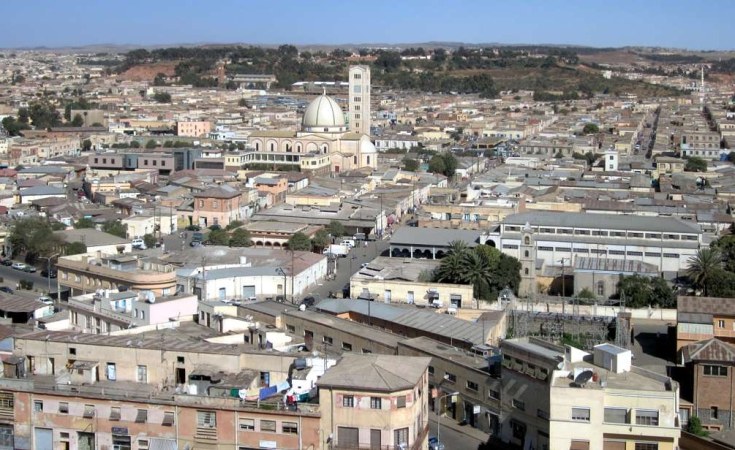Eritrea has historically struggled to attract large investments because of its unfavourable business climate including corruption, strong state control over currencies, legal uncertainty, an arbitrary judicial system, and a low-skilled labour force drained by mass migration.
Having one of the most erratic economies in the world, partly due to chronic drought and highly variable agricultural output, its GDP surged by 31 per cent in 2014 before plummeting by -20.6 per cent in 2015. It nosedived again in 2017, this time by -10 per cent, before jumping by 13 per cent in 2018.
Dubbed 'the North Korea of Africa', Eritrea has been ruled with an iron fist by its leader- 76-year-old President Isaias Afwerki - since he led it to independence from Ethiopia in 1993. It is one of the world's most repressive and secretive states, experiencing prolonged periods of conflict and severe drought have had a catastrophic impact on the Eritrean economy.
HDI
The country is one of the world's poorest, with income per head estimated at US$678 in 2022 (up from US$501 in 2010). Across the country, an estimated two-thirds of households are impacted by food insecurity.
Eritrea has a Human Development Index (HDI) of 0.459 as of 2022, which puts it among the 15 least-developed countries on the planet.
The HDI measures average achievement in key dimensions of human development: a long and healthy life based on life expectancy at birth, knowledge based on expected years of schooling and a decent standard of living.
Mauritius, Seychelles and Algeria are the top three African countries with high HDIs of 0.804, 0.796 and 0.748, respectively, while Central African Republic, Niger and Somalia tail with very low HDIs of 0.397, 0.394 and 0.361, respectively.
FDI Increase
However, over the past five years, Foreign Direct Investment (FDI) inflow to Eritrea has increased at a compound annual growth rate of 6 per cent, from US$41 million to US$55 million in 2017.
In 2019, the country received US$67.1m in foreign direct investment (FDI) inflows against US$61m in 2018, according to the World Bank.
FDI flows to Eritrea amounted to US$74 million in 2020 despite the global economic crisis triggered by the Covid-19 pandemic, but it still remains the second lowest in the region after Comoros.
The biggest contributor to this inflow is Eritrea's mineral resources which have attracted many investors, including China - the country's largest investor, creditor and trading partner. The other large investors in Eritrea are Germany, the United States and Canada.
Mining
Several US and European companies have considered investing in tourism, cement, mining and oil in 2017.
A joint venture between a Canadian company (NEVSUN) and the Eritrean government established the Bisha Mining Company. It's one of the largest mining conglomerates in the country and mines gold, copper, and zinc.
Eritrea's natural mineral resources are copper, potash, zinc, oil, natural gas, cement, gypsum, granite, marble, ceramics, limestone, and iron ore.
Attracting investors
To attract new investors, the government of Eritrea created a Free Zone Authority in the port city of Massawa primarily in energy, tourism, and fishing. There also exists another Free Trade Zone along the common border between Eritrea and Sudan which is not operational.
The Port of Massawa is a transit point for goods to the Middle East, European, and Asian markets given its strategic location along the Red Sea. It now has been opened to landlocked Ethiopia, which has the second largest population in Africa.
Its location will help boost investments from Middle Eastern and Asian countries that have begun investing in Eritrea, while the United States of America (USA) FDI inflow to Eritrea has decreased since 2003.
The decreased investments from the USA has been due to Eritrea's trade relationship with North Korea where the USA imposed sanctions on Eritrea as a result of its relations.
However, Eritrea has since made efforts to limit its relations with Korea, contributing less than 1 per cent to South Korean imports and receiving less than 1 per cent of export goods from South Korea, low despite Eritrea's strategic port locations.
The same could also be attributed to political repression, lack of transparency of the regulatory system, along with technological isolation which the US government outlined in its report titled 2021 Investment Climate Statements: Eritrea.
In the report, the US stated that with the exception of the mining sector, Eritrea's investment climate is not conducive to US investment, thus limiting investment. Most commercial enterprises are state-controlled or run by the sole political party, the Peoples Front for Democracy and Justice (PFDJ). The Government of the State of Eritrea (GSE) is the country's largest employer. Most citizens are required to participate in the country's national service programme, which often results in indefinite terms of service at very low wages in a wide range of public sector positions.
Eritrea also recently opened its borders to Ethiopia for the first time in 20 years, allowing landlocked Ethiopia to use Eritrea's Massawa port for direct access to the Red Sea. This act may strengthen investor confidence as well as economic growth.
The government invests in agriculture to further strengthen trade with the Middle East and Asia. Its largest export is pepper which also provides a way to support rural livelihoods.


